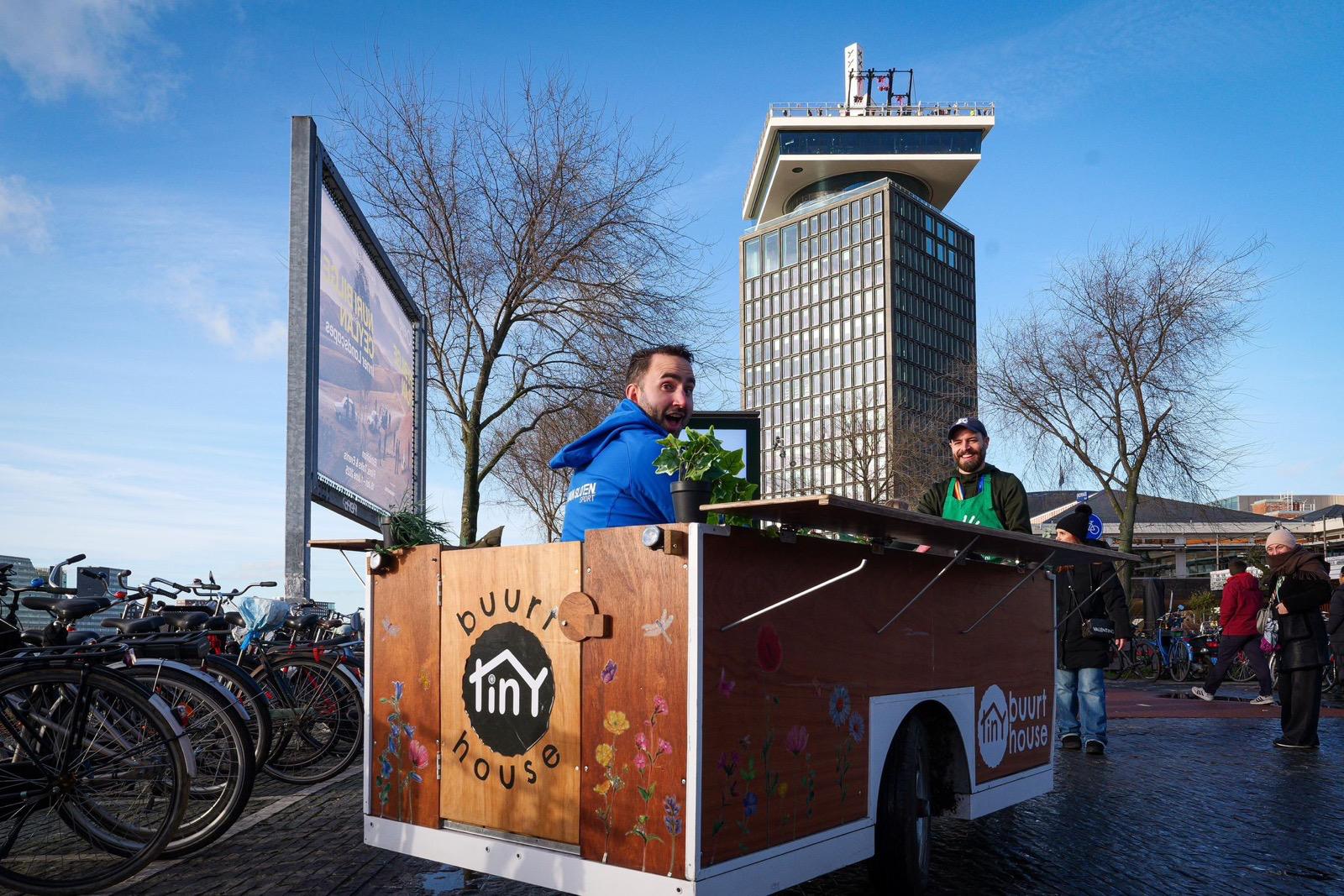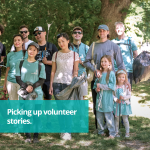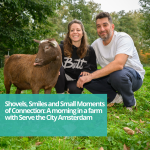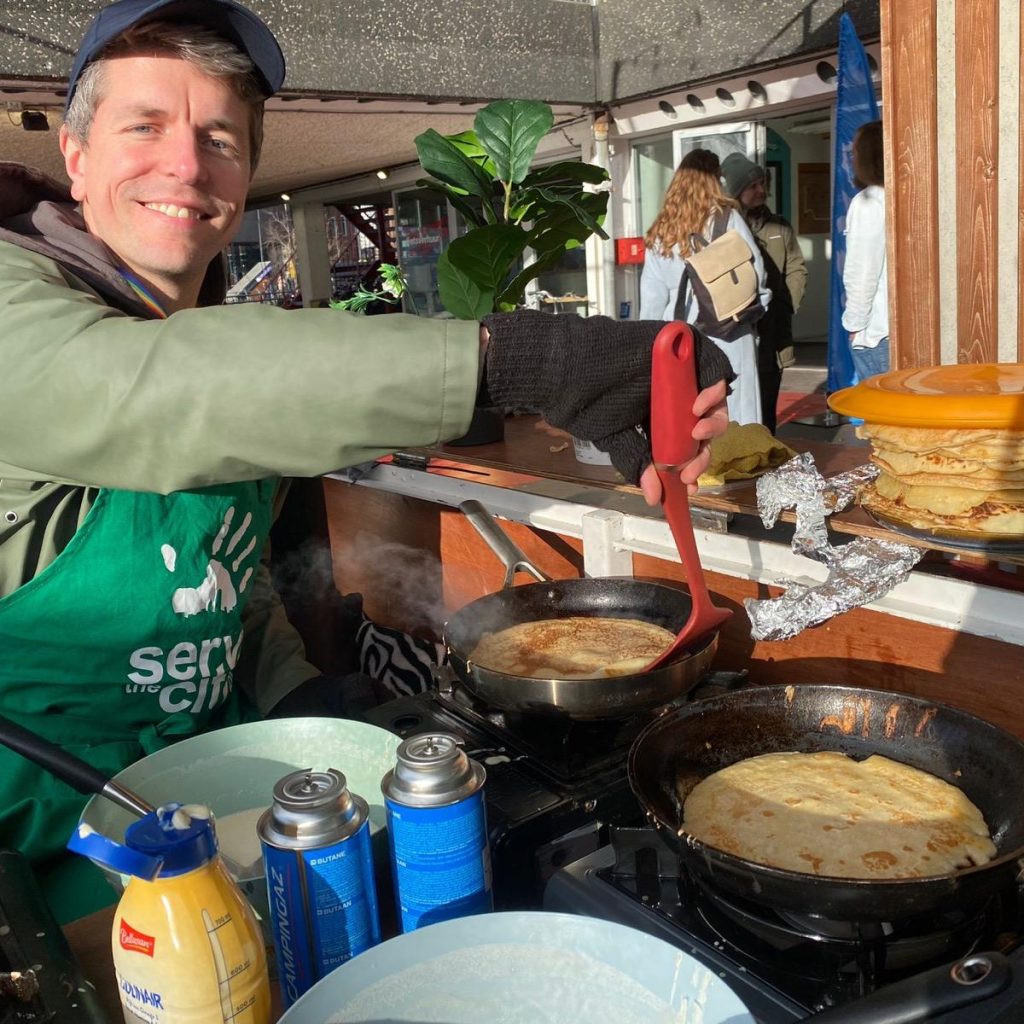
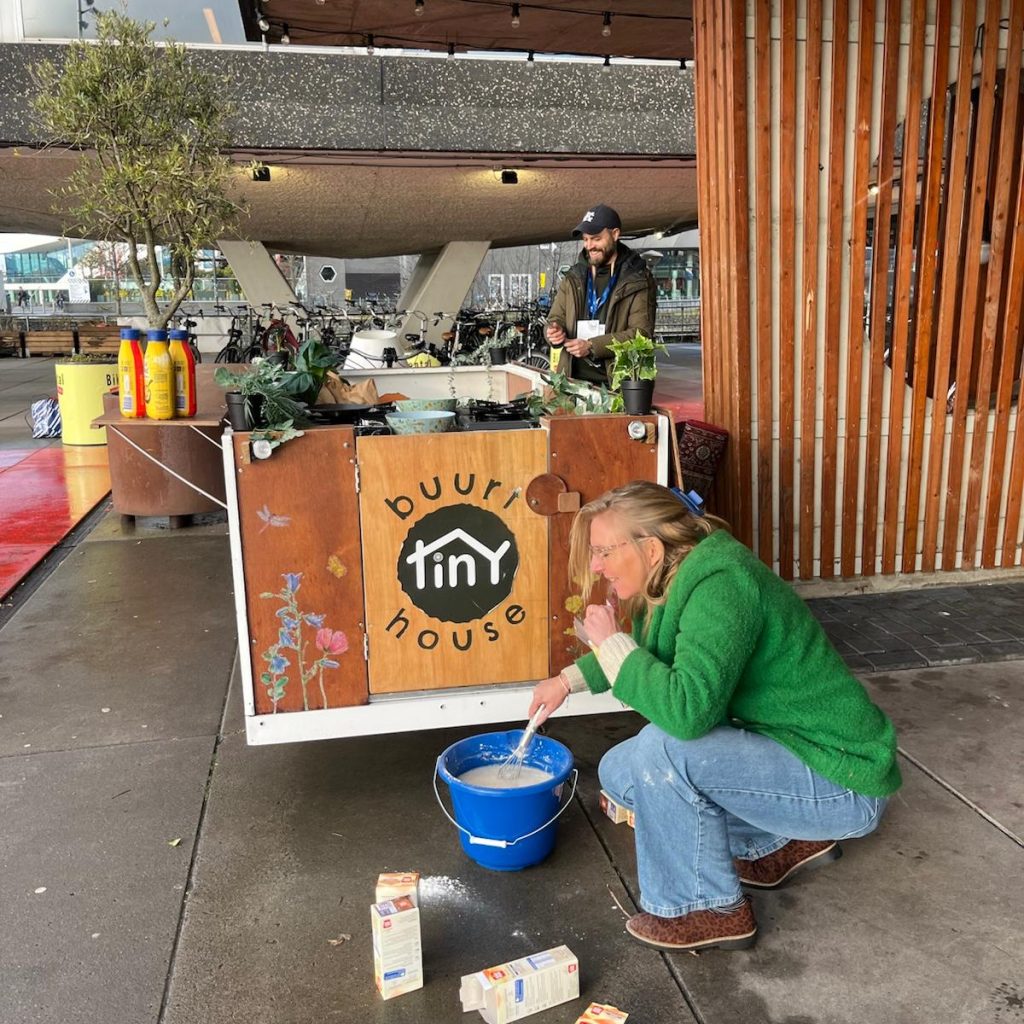
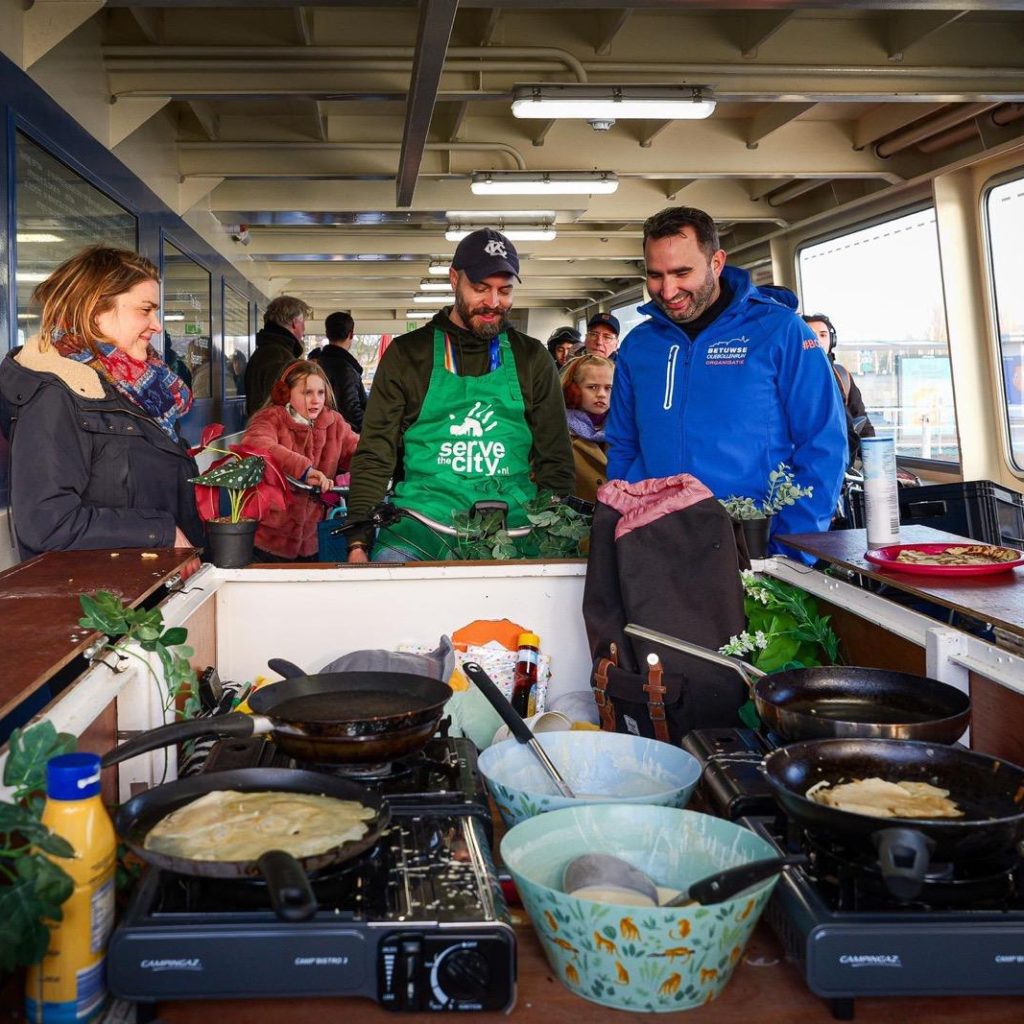
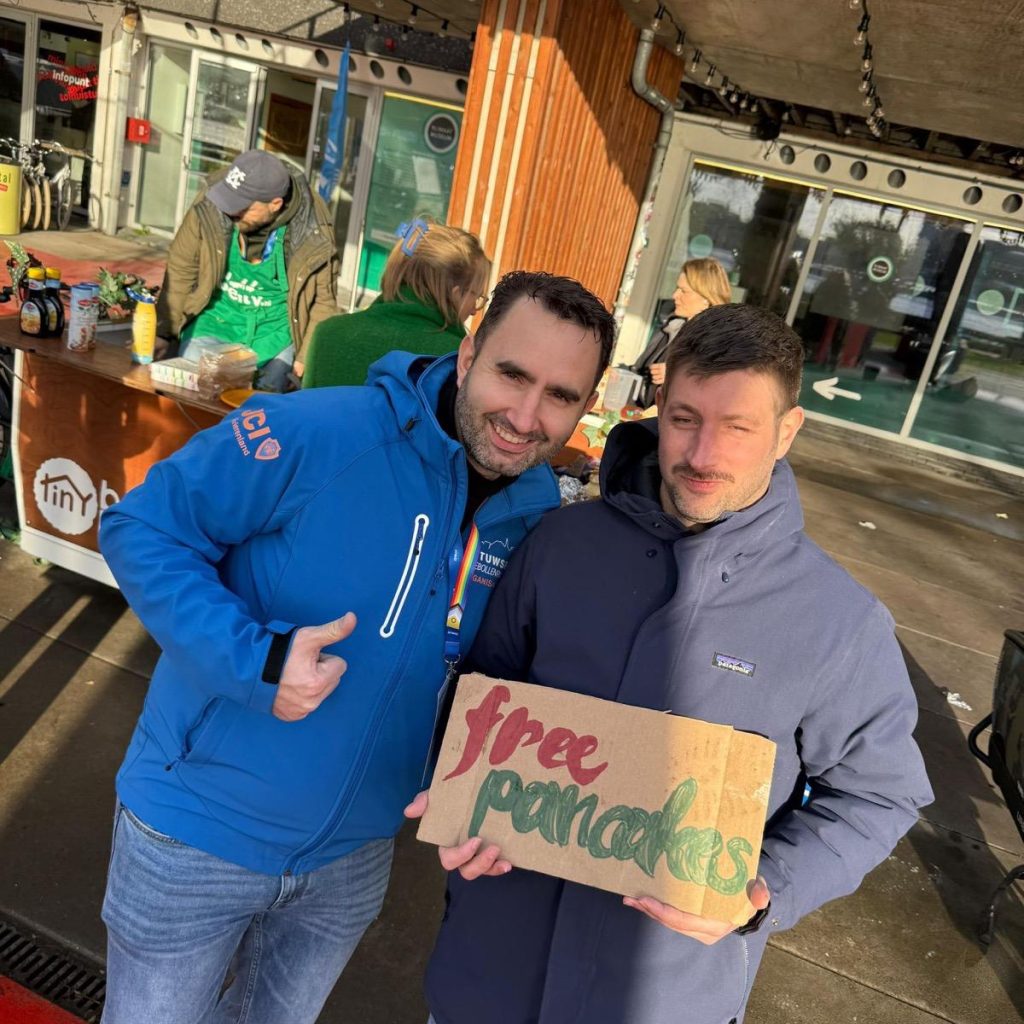
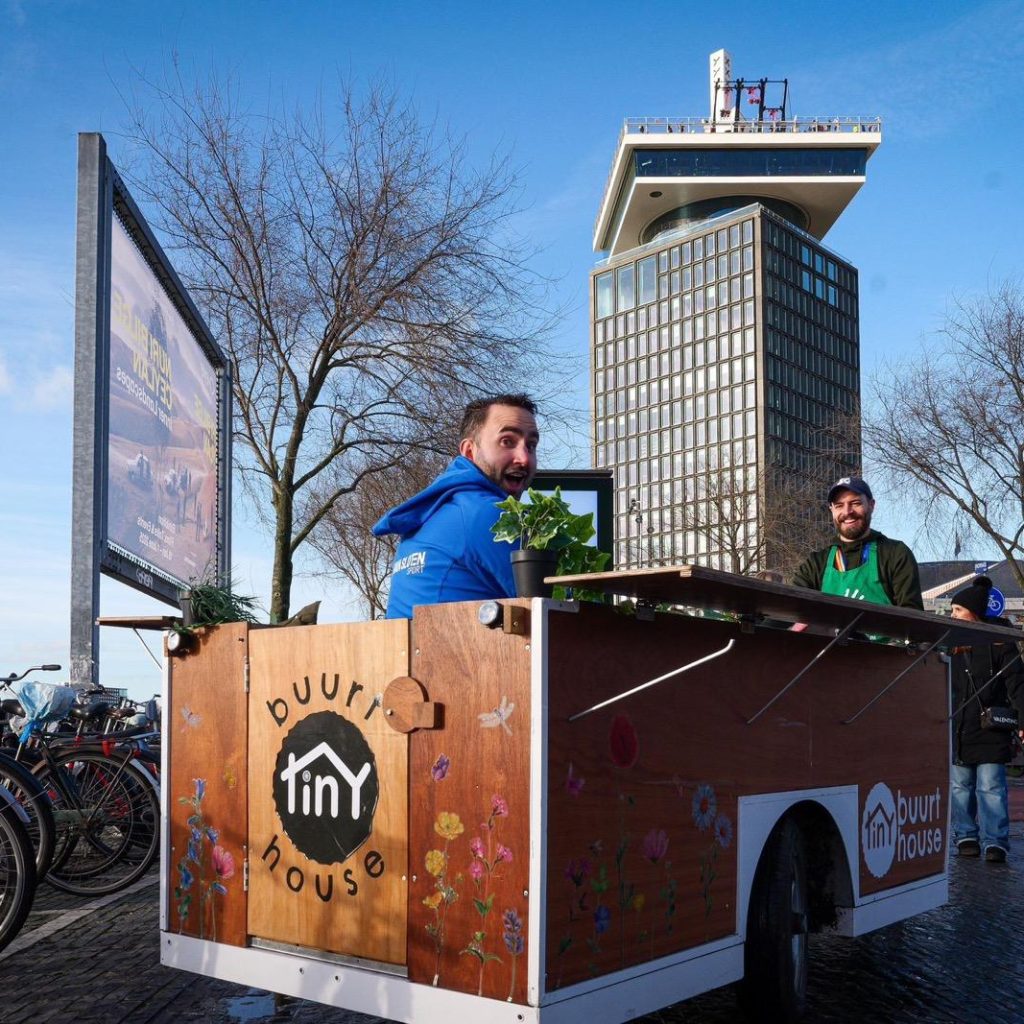
Running reporter: Catherine Feng
This piece was written by a running reporter about her experience volunteering with Serve the City. She joined a project in Amsterdam Noord with JCI (Junior Chamber International), who baked pancakes and handed them out on the ferry, in collaboration with the Tiny Buurthouse. Read along to see how she experienced it and what personal barriers she overcame along the way.
The Foreign Concept of Genuine Connection
I arrived at Tolhuistuin on a grey Saturday afternoon, my body moving on autopilot after a morning that had left me emotionally drained—a splurge of heavy emptiness weighing me down like wet concrete. With my headphones jammed in, hard techno numbed my ears, a rhythmic barricade between myself and the world. The last thing I wanted was to engage with strangers in a busy, overstimulating space.
But the event was free. And pancakes were involved.
The ferry ride to Buiksloterweg in Amsterdam Noord was mechanical—my feet carried me forward, but my mind lagged behind, detached and unfeeling. When I finally arrived at the venue, I hastily walked up the stairs, keeping my gaze low, hoping to slip into the scene unnoticed.
Then I saw Brigitte, effortlessly holding court amidst two middle-aged men, all of them munching on broodjes, laughing like old friends. Their ease with one another was jarring—were people actually enjoying themselves without an ulterior motive?
Her gaze met mine, and she smiled.
“Hey, great that you’re here.”
I barely had time to process the warmth in her voice before being introduced to Alex, from Kansas, and Douglas, from the UK. And then something strange happened. We connected.
“You don’t have to have done anything before. It’s all, like, a low learning curve, and they welcome anyone that’s willing to do it.” – Alex
I hadn’t expected this. People were talking to me. Actually talking to me. Without obligation. Without some hidden transaction in play. I struggled to conceive of the idea that there existed individuals who were not paid to enjoy helping out, who genuinely wanted to connect with new people.
Before this moment, volunteering felt like an obligation, something formalised and demanding. Yet, Alex described it as the opposite—accessible, flexible, and judgment-free.
“Some organisations only have volunteering opportunities once a month, so if you miss it, you have to wait another month. But Serve the City has frequent opportunities, so if you can’t do it this week, there’s another one next week.” – Alex
His words revealed something important: the barriers to participation are often structural, not personal. Serve the City’s flexibility reduces the friction of entry, making it easier to engage without committing long-term.
A stigma broke in my mind that day, the assumption that volunteering was always some laborious obligation rather than an experience that could be social, fulfilling, and inherently rewarding.
Proximity matters. Accessibility matters. Serve the City’s model works because it meets people where they are—both physically and emotionally.
Beyond the Self: A Lesson in Humility
When I first saw Brigitte, the director of Serve the City, crouched next to a blue bucket, mixing pancake batter, I was struck by how naturally leadership and manual labour merged. There was no hierarchy in genuine community—just people working together.
I didn’t know this kind of humility existed in leadership. In an era where performative altruism runs rampant and every good deed is plastered online for validation, there was no narcissism here. No self-conceit. Just people, working, creating, contributing—together.
And this realisation echoed throughout the interviews.
“I always wanted to be a social worker. Volunteering put me in contact with situations that I didn’t otherwise have the qualifications for.” – Douglas
Douglas’ story highlights volunteering as a tool for professional exposure. It’s a gateway into industries that might otherwise feel inaccessible.
“For me, it was a way to get first-hand experience, like shadowing or an apprenticeship. I could see how things worked behind the scenes before deciding if I wanted to go further.”
Alex echoed this:
“I wasn’t expecting to gain soft skills from this, but it’s an unintended benefit.”
Here, we see how volunteering is more than just ‘giving back’—it’s an ecosystem of learning. Serve the City organically fosters leadership, adaptability, and skill-building in ways that even corporate environments struggle to replicate.
Bed-Rotting, Doom-Scrolling & the Need for Community
In today’s attention economy, where big tech feeds our obsession with self-image and individual validation, moments like this are increasingly rare. We doom-scroll, bed-rot, and convince ourselves that disconnection is normal. Instant gratification often outweighs long-term fulfilment, and people (myself included) struggle to stay engaged in activities that don’t provide immediate rewards.
Yet, Douglas and Alex described a different experience—one where delayed gratification and community bonds kept them coming back.
“If I made someone smile today or did something that wasn’t for my own gain—that’s a check on the day for me.” – Douglas
His statement challenged the transactional nature of modern engagement. He wasn’t there for clout, money, or recognition—he was there because it felt good to do something beyond himself.
“We were a core team of six people. We’d have dinner together, reflect on our projects, and plan for the next. That gave me a huge sense of belonging.” – Douglas
Connection, not obligation, drives long-term engagement. The more people feel seen, valued, and integrated into a community, the more likely they are to return and contribute consistently.
“The variety keeps me coming back. It pushes me to try new things instead of sticking to what I already know.” – Alex
This reinforces research on volunteer retention—people are more likely to stay involved when their roles evolve, offering growth, new experiences, and social bonds. But this day proved otherwise.
“If I stay at home all weekend and binge Netflix, I might feel rested physically, but mentally, I’m drained.” – Douglas
This struck a deep chord. Maybe the cure for our hyper-isolated, dopamine-fueled world isn’t found in endless distraction, but in real human connection.
We think isolation is rest, but it often leaves us emptier. Volunteering reintroduces structure, purpose, and interaction—all of which combat the creeping alienation of modern life.
Why We Need Gen Z
Serve the City’s model works because it is fluid, adaptable, and welcoming to all. But what does this mean for the future?
“It’s not a long-term commitment. You can try it once, and if it’s not for you, you don’t have to do it ever again.” – Douglas
This eliminates the fear of obligation—which is crucial for engaging younger generations who value autonomy and flexibility.
“The networking opportunity is huge. I met people I’d never interact with otherwise.” – Alex
Volunteering is also a tool for expanding professional and social circles—something that can’t be replicated through digital interactions alone.
And ultimately, that’s why Gen Z is key to STC’s future. They are mobile, digitally savvy, and capable of mobilizing real-world impact—if given the right space to do so.
“It’s a win-win. I gain experience, meet people, and help others at the same time.” – Alex
I came to Tolhuistuin that day disconnected, overstimulated, and unwilling to engage. But I didn’t just witness a pancake event. I witnessed a system working—a structure of human engagement that wasn’t deprived of authenticity.
“The flexibility keeps me coming back. I try new things instead of sticking to what I already know.” – Alex
We need connection. We need to get out of our heads and into shared spaces. And more than anything, we need Gen Z’s mobility—their ability to move fluidly between digital spaces and real-life activism, to mobilize communities when given the right space to thrive.
And perhaps, most importantly, it reminded me that sometimes, all it takes to shift a perspective is a free pancake and a blue bucket of batter.
This is proof that flipping pancakes can flip someone’s day around. 🥞
Craving connection or ready to meet new people? Step out of your comfort zone.
Join our activities at Serve the City Amsterdam. Where small acts make a big difference.
